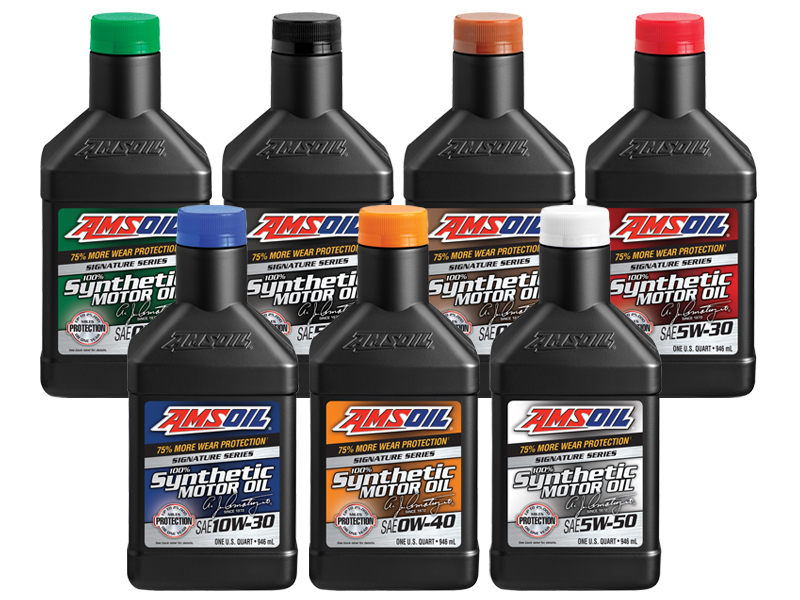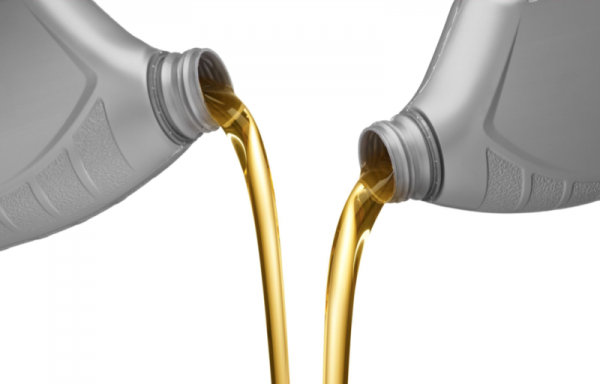
Scott D. Galbreath asks via our Facebook page about the pros and cons of synthetic blend motor oils. Thanks for the question, Scott.
Making sense of motor oil can be confusing and frustrating. Choosing among full synthetics, synthetic blends, semi-conventional, conventional, high-mileage full synthetics and synthetic blends is just the beginning.
For many, synthetic blends and semi-synthetics are the most confusing. In part, this is because they fall between conventional and full synthetics on the motor oil spectrum. Examining the pros and cons of synthetic blends can help eliminate confusion.
Are Synthetic Blends and Semi-Synthetics the Same?
When evaluating synthetic blends, it’s helpful to define the terms “synthetic blend” and “semi-synthetic”.
Generally speaking, synthetic blends and semi-synthetic refer to the same thing: an oil that uses a combination of conventional and synthetic base oils in its formulation.
It’s important to note that, while base oils are a fundamental element of a motor oil’s formulation, they’re only part of the picture. Additives make up the other part of the equation, and the quality and concentration of additives have a significant affect on the oil’s protection and performance.
For more, check out our definitive guide on synthetic vs. conventional oil.
Lastly, there are no industry specifications or regulations that define a minimum amount of synthetic base oil that must be present for an oil to be classified as a synthetic blend or semi-synthetic.
There are no industry specifications or regulations that define a minimum amount of synthetic base oil that must be present for an oil to be classified as a synthetic blend or semi-synthetic.

Uncertainty in a Bottle
This uncertainty presents a few problems.
For starters, the level of protection the oil delivers compared to a conventional oil can vary depending on the proportion and quality of the synthetic base oils in the formulation.
Because synthetic base oils have greater molecular uniformity and stability compared to conventional base oils, they reduce oil burn-off in the presence of extreme heat and oxidation, which results in…
- Reduced oil consumption
- Improved wear protection
- A cleaner engine
However, obtaining these benefits from a semi-synthetic or blend is in direct proportion to the amount of synthetic base oils in the formulation, which is unclear at best and dubious at worst.
For a deeper dive on how much “synthetic” is in your oil, check out this post.
Synthetic-Blends are Being Left Behind
In addition to uncertainty over quality, semi-synthetics and blends are in danger of being left behind as advances in automotive technology and increasingly strict original equipment manufacturer (OEM) specifications continue to raise the bar for motor oil protection.
It’s becoming more difficult for blends to meet and exceed these specifications. For example, take the GM dexos1® Gen 2 specification.
While it may be possible to meet the requirements of GM dexos1 Gen 2 with a blend, the majority of brands that meet the specification appear to be full synthetics. Offering protection beyond the dexos1 Gen 2 spec likely requires an oil made from synthetic base oils and a robust, well-balanced additive package.
Which Should You Choose?
Historically, synthetic blends have offered the advantage of lower price compared to full synthetics. As the full synthetic category has matured, however, this price advantage has diminished.
Using the passenger car motor oil category as a barometer for the popularity of synthetic blends shows that blends account for the smallest share of the category and blends have experienced little-to-no growth recently.
Many motorists – and enthusiasts in particular – want the best engine protection they can afford. And many of them conclude that, when it comes to synthetics, the old adage, “If some is good, more is better” holds true. That’s why full synthetics continue to grow in popularity.
This same belief drives our focus on formulating synthetic motor oils with more built-in protection to exceed industry and OEM specifications. No matter what’s in your garage or your bank roll, AMSOIL has a 100% synthetic oil for you that delivers more protection.
Updated. Originally published Sept. 22, 2017.









how about the SAE?
What is the best and least exspensive oil for a small block Chevy with flat tapper cam?
Eddie
Hi Eddie,
We need more information about your application to provide a product recommendation. Call or email AMSOIL Technical Services and they’ll be happy to help: 715-399-TECH or [email protected].
Thanks,
John
Castrol 0/40
Could you recommend a superior alternative to Mitsubishi CVT transmission fluid found in 2008 Outlander?
Hi Alex,
We sure can. We recommend AMSOIL Synthetic CVT Fluid in the 2008 Outlander equipped with the 2.4L engine.
Thanks,
John
Can you put a older Diesel engine on synthetic oils and it not hurt or do any damage to it?
Hi Keith,
Yes, you can switch to synthetics at any time without issues. Check out this post for details.
Thanks,
John
Should I be putting Synthetic oil in my 2011 xc60 volvo that has 85,0000 miles on it . I drive in Los Angeles alot
or stick to conventional oil
Hi Denielle,
If you want the best protection, yes. I suspect you’re often idling in traffic or engaged in stop-and-go driving. These conditions fall under the “severe” designation, meaning you want to use the best oil possible to protect your engine from stress. It’s never too late to switch to synthetics for the first time, particularly in a car with just 85,000 miles. For the best engine protection, use synthetic oil at your next oil change.
Thanks,
John
I have a 93 F-250 Pickup that I just picked up last month. What Oil do you recommend
Hi Tom,
Check out our Product Guide for product recommendations.
Thanks,
John
Give Shell gas truck full synthetic a try. About $20.00 for five quart jug at Walmart.
What is best oil for 2011 Lincoln MKS with 3.7 v6
Hi Fred,
Check out our Product Guide for recommendations. In your case, our best option in Signature Series 5W-20 Synthetic Motor Oil.
Thanks,
John
Any full synthetic with the API donut seal on the bottle.
so if i switch from conventional to full synthetic do i need to use a synthetic blend before i do full synthetic?
Hi Austin,
No, you don’t need to do anything special. Simply drain the conventional oil and refill your crankcase with synthetic oil.
Thanks,
John
Would it be a good idea to put fully synthetic oil in the engine of my moto guzzi le man’s mk 2 motor cycle 1978yr.and what grade? It has nicosil bores, higher compression and up rated cams. I’ve put miller’s oil, crx 75w140 nt. In the gearbox and r/wheel drive box is that good?
Hi Keith,
I recommend contacting AMSOIL Technical Services at [email protected] for specific product recommendations.
Thanks,
John
I’m glad you mentioned that additives are important to consider in addition to the base oil when choosing a synthetic or semi-synthetic motor oil. My brother needs to find industrial motor oil for the heavy-duty equipment he got for his service business. I’ll pass along this info so he knows what factors to consider when choosing the best motor oil soon.
Any good quality synthetic oils are fine. There are people that have used Walmart Super Tech full synthetic oil and have over 200,000 miles and still running strong. Clean oil is best oil.